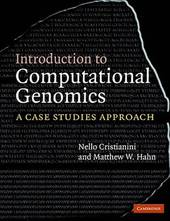
|
Introduction to Computational Genomics: A Case Studies Approach
Paperback / softback
Main Details
| Title |
Introduction to Computational Genomics: A Case Studies Approach
|
| Authors and Contributors |
By (author) Nello Cristianini
|
|
By (author) Matthew W. Hahn
|
| Physical Properties |
| Format:Paperback / softback | | Pages:202 | | Dimensions(mm): Height 246,Width 189 |
|
| Category/Genre | Genetics (non-medical)
Computer science |
|---|
| ISBN/Barcode |
9780521671910
|
| Classifications | Dewey:572.860285 |
|---|
| Audience | | Tertiary Education (US: College) | | Professional & Vocational | |
|---|
| Illustrations |
Worked examples or Exercises; 12 Tables, unspecified; 3 Halftones, unspecified; 48 Line drawings, unspecified; 6 Line drawings, color
|
|
Publishing Details |
| Publisher |
Cambridge University Press
|
| Imprint |
Cambridge University Press
|
| Publication Date |
14 December 2006 |
| Publication Country |
United Kingdom
|
Description
Where did SARS come from? Have we inherited genes from Neanderthals? How do plants use their internal clock? The genomic revolution in biology enables us to answer such questions. But the revolution would have been impossible without the support of powerful computational and statistical methods that enable us to exploit genomic data. Many universities are introducing courses to train the next generation of bioinformaticians: biologists fluent in mathematics and computer science, and data analysts familiar with biology. This readable and entertaining book, based on successful taught courses, provides a roadmap to navigate entry to this field. It guides the reader through key achievements of bioinformatics, using a hands-on approach. Statistical sequence analysis, sequence alignment, hidden Markov models, gene and motif finding and more, are introduced in a rigorous yet accessible way. A companion website provides the reader with Matlab-related software tools for reproducing the steps demonstrated in the book.
Author Biography
Nello Cristianini is a Professor of Artificial Intelligence, University of Bristol Matthew Hahn is an Assistant Professor at the Department of Biology and School of Informatics, Indiana University
|